Boca Raton Addiction Treatment & Mental Health Resources Guide
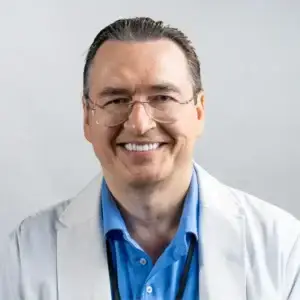
Dr. Rostislav Ignatov, MD
Chief Medical Officer
Boca Raton and the wider Palm Beach County community continue to face challenges with substance use and mental health. While fatal overdoses have declined by nearly half from 2023 to 2024, opioid and stimulant use still contribute to hundreds of emergency calls each year. Local officials credit expanded naloxone distribution and real-time overdose tracking for this improvement, but demand for treatment and support remains high.
Mental health needs are also widespread. Residents cite stress, depression, and substance use among the top health concerns in county surveys, and behavioral health services are stretched to meet demand. School leaders report rising levels of anxiety and emotional distress among children and teens, pointing to the need for early support.
This guide brings together current statistics, treatment options, and recovery resources available in Boca Raton. You will find information about local services, insurance coverage, peer networks, and what to look for when choosing professional care. For those seeking a higher level of treatment, The Haven Detox near Boca Raton provides safe, evidence-based support in a resort-like environment, with admissions specialists available 24/7.
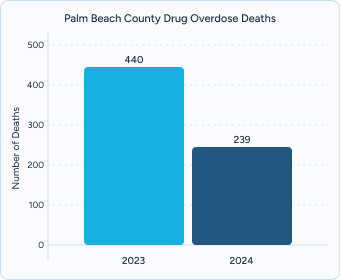
Palm Beach County reported an estimated 440 drug overdose deaths in 2023, compared to 239 deaths in 2024, according to Florida Department of Health data. The county’s new overdose dashboard also tracked 379 suspected overdoses in December 2024 alone, showing that while fatalities dropped, hundreds of residents still face overdose risks each month.
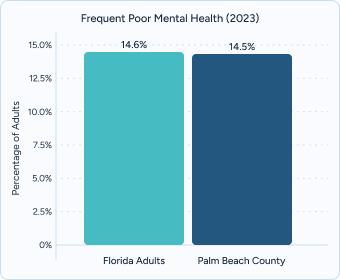
In the 2023 Palm Beach County Community Health Assessment, residents ranked mental health and substance use among the top five health priorities. Florida Health CHARTS data show that 14.6% of adults statewide reported frequent poor mental health in 2023, while Palm Beach County trends mirror these levels, with local health leaders citing gaps in access to psychiatric care and timely outpatient services.
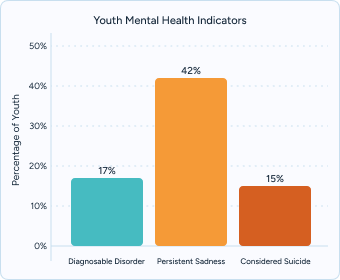
The School District of Palm Beach County estimates that about 17% of children ages 6–17 are living with a diagnosable mental health disorder. In addition, the CDC’s 2023 Youth Risk Behavior Survey reported that 42% of Florida high school students experienced persistent sadness or hopelessness, and 15% seriously considered attempting suicide. These findings reflect the urgent need for early behavioral health supports among Boca Raton’s youth.
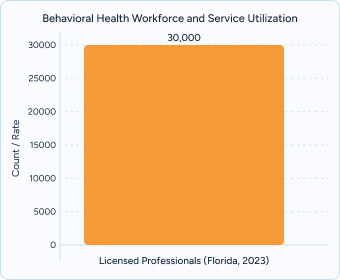
Florida Health CHARTS indicates that over 30,000 licensed behavioral health professionals were active in the state in 2023, equal to 133.2 per 100,000 residents. While Palm Beach County benefits from a robust health network, service utilization continues to rise, with emergency departments reporting extended “boarding” times for patients in crisis awaiting placement.
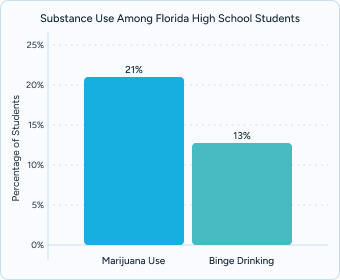
In 2023, the CDC reported that 21% of Florida high school students used marijuana and 13% engaged in binge drinking in the past month. Alcohol, vaping, and cannabis are the most common substances among Palm Beach teens, with prevention programs focusing on reducing these risks early.
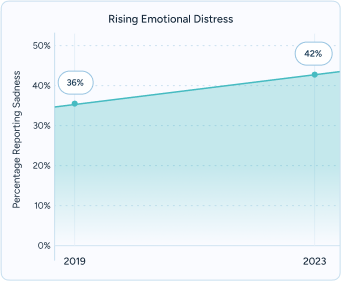
42% of Florida high school students reported persistent sadness or hopelessness in 2023, up from 36% in 2019. Local school surveys confirm increasing anxiety, depression, and social isolation among Palm Beach County students, with schools expanding mental health staff to meet demand.

The School District of Palm Beach County estimates that fewer than half of children with a diagnosable disorder receive treatment. Florida Health CHARTS data also show that 17% of young adults report psychological distress, compared to 14% of adults overall, highlighting the challenges transitional-age youth face in getting care.

Boca Raton residents have access to the Palm Beach County 988 crisis response system, which connects callers to trained counselors for immediate support. In addition, the county operates Mobile Crisis Response Teams that provide on-site intervention for children, teens, and adults experiencing psychiatric or substance-related crises. These services can stabilize patients at home or in the community, reducing unnecessary hospitalizations.
Several nonprofit organizations provide outpatient therapy, case management, and psychiatric care throughout Palm Beach County. Many of these centers receive state funding and accept Medicaid, making them accessible to Boca Raton residents. Specialized programming includes trauma-informed counseling, family therapy, and treatment for co-occurring substance use and mental health disorders.
Boca Raton Regional Hospital and nearby facilities in West Palm Beach offer psychiatric emergency services, inpatient stabilization, and referral pathways into longer-term treatment. Emergency departments in the county often serve as first points of contact for patients in acute crisis, with care coordinators linking patients to community providers.
Access to care is supported by Palm Tran bus routes and Palm Tran Connection paratransit services for residents with disabilities. Many community agencies also provide transportation vouchers for patients entering treatment, ensuring that distance is less of a barrier to receiving care.
Palm Beach County’s network of Certified Recovery Peer Specialists provides mentorship, advocacy, and navigation for patients seeking treatment or re-entering the community after hospitalization. Peer programs are integrated into many nonprofit agencies and help families stay engaged with services over time.
Florida Medicaid Managed Care covers 100% of treatment costs for qualified residents, including medical detox, residential programs, outpatient therapy, and approved medications such as buprenorphine and naltrexone. Recent benefit updates have eliminated copays for substance use treatment, expanding access for low-income residents through managed-care plans.
The Florida Department of Children and Families offers sliding-scale programs for uninsured residents up to certain poverty levels. Applications are available through local DCF offices or online, with support in English, Spanish, and Haitian Creole. These programs help cover detox, outpatient counseling, and residential stabilization when no other insurance is available.
The Palm Beach County Office of Behavioral Health provides navigation and funding for uninsured residents through 211 Palm Beach/Treasure Coast. By calling 211 or visiting 211palmbeach.org, residents can access referrals to more than 20 partner agencies offering treatment slots, peer support, and family resources.
For those seeking private treatment in Boca Raton without long waiting lists, several South Florida facilities offer direct admission with free insurance verification. These programs typically provide a full clinical assessment, medical detox when needed, and evidence-based approaches such as cognitive-behavioral therapy, trauma-focused therapies, and medication-assisted treatment.
Professional facilities often provide advantages over state-funded programs, including:
Many accept insurance authorization within 24 hours and can coordinate same-day admission when clinically appropriate.
Comprehensive mental health services across South Palm Beach County include depression treatment, anxiety care, and dual-diagnosis support serving Boca Raton, Delray Beach, and Boynton Beach. Programs emphasize culturally competent care with bilingual providers in Spanish and Haitian Creole, trauma-informed approaches for all age groups, and specialized services for veterans and first responders.
The Haven Detox – Florida serves Boca Raton and greater Palm Beach County with immediate access to evidence-based treatment. The facility offers a comprehensive approach that combines proven clinical therapies—such as Cognitive Behavioral Therapy (CBT) and Dialectical Behavior Therapy (DBT)—with a range of holistic and innovative healing options.
Our specialized services include:
With 24/7 medical detox supervision and one of the highest staff-to-client ratios in South Florida, the West Palm Beach location offers both short-term detox and residential programs. Clients experience a resort-style environment featuring professionally catered meals, a fully equipped gym, a game room, and outdoor recreation areas.
The Haven serves individuals with co-occurring substance use and mental health disorders and accepts most major insurance plans, including Florida Blue, Cigna, Aetna, Medicaid, and TRICARE. Transportation assistance is available throughout Palm Beach County to ensure seamless access to care.
Palm Beach County residents, including those in Boca Raton, have access to free peer-led recovery programs that provide safe, supportive environments outside of formal treatment. These centers focus on wellness, mentorship, and building strong sober networks.
Residents of Boca Raton can access structured sober housing certified by the Florida Association of Recovery Residences (FARR). Certification ensures accountability, safety, and adherence to recovery-supportive standards. Common features include:
Families can explore the FARR directory to find certified homes throughout Palm Beach County.
Boca Raton hosts a wide range of community-led recovery meetings every week. These provide connection, accountability, and encouragement for people at all stages of change.
High-quality treatment begins with a full evaluation that looks at both substance use and mental health needs. Because many Boca Raton patients experience co-occurring conditions such as depression, anxiety, or trauma, programs that address both at once are more effective.
Programs in Boca Raton that deliver therapies supported by research tend to achieve better outcomes. Look for:
FDA-approved medications like buprenorphine (Suboxone), naltrexone (Vivitrol), and methadone, when combined with counseling, reduce relapse risk and increase treatment retention. In Florida, MAT is offered in inpatient, outpatient, and community settings, with ongoing medical supervision to ensure safety.
Beyond clinical therapies, supportive services can strengthen long-term stability. Many Boca Raton programs integrate:
In Palm Beach County’s diverse community, culturally competent services improve engagement. Programs with bilingual staff, LGBTQ+ affirming support, and faith-based options help ensure treatment feels inclusive and accessible.
Effective programs in Boca Raton and Palm Beach County start planning for continuing care while a patient is still in treatment. This includes warm handoffs to outpatient therapy, referrals to sober living environments, and scheduled connections with peer recovery groups. Patients leaving residential or detox services are more likely to stay engaged when follow-up appointments are secured before discharge.
Involving loved ones in treatment planning has been shown to improve patient success. Many Boca Raton programs include multi-family therapy sessions, educational workshops, and family support specialists who provide coaching and advocacy. Families learn how to recognize relapse warning signs, set healthy boundaries, and access community resources.
Peer recovery specialists and alumni networks in Palm Beach County play a critical role in helping patients stay connected after treatment. Alumni programs often include mentoring, community service, sober events, and support groups that extend the sense of accountability and belonging.
Programs that collaborate with local organizations—such as housing providers, employment agencies, and wellness centers—help patients address social needs that influence stability. Coordinated care ensures that treatment is not just a short-term intervention but part of a larger continuum of support.
Professional treatment offers access to medical oversight, structured care, and resources that are difficult to achieve outside of a licensed setting. For Boca Raton residents, entering a trusted program provides both immediate stabilization and a foundation for lasting change.
Many Boca Raton treatment programs recognize the impact of trauma on substance use and mental health. Evidence-based trauma therapies such as EMDR and cognitive processing therapy are often available, and clinical staff receive specialized training to deliver care in a safe, supportive way.
Long-term stability is strengthened by peer and alumni programs that keep patients connected after treatment. Alumni groups in Palm Beach County often host community events, mentorship opportunities, and sober activities that help reinforce accountability and belonging.
Because navigating coverage can be overwhelming, many programs offer dedicated benefits coordinators who help patients verify insurance, secure prior authorizations, and explore financial assistance if uninsured. This reduces barriers to entering or continuing care.
The most effective programs combine traditional therapies with holistic practices. Patients may access yoga and meditation, art therapy, and wellness coaching alongside medical and clinical services. This whole-person approach helps reduce stress and build coping strategies that support daily life.
Boca Raton programs often provide dual-diagnosis treatment, addressing mental health conditions like depression or PTSD alongside substance use. Treating both together has been shown to improve engagement and reduce relapse risk.
Professional treatment represents an investment in recovery success, offering immediate access, personalized care, and comprehensive services designed to address the complex nature of addiction and mental health conditions.
Change does not have to wait. With professional treatment available in Boca Raton and across Palm Beach County, you can begin the process as soon as you are ready.
Admissions specialists are available around the clock to answer questions, provide screenings, and guide you through your options for treatment.
Most insurance plans can be verified within 24 hours, giving you a clear understanding of your benefits before starting care. For patients without insurance, staff can connect you to state-funded programs and community resources.
When clinically appropriate, same-day admission is available. Intake staff provide evaluations, coordinate with insurance, and make sure your transition into treatment is as smooth as possible.
Whether you need medical detox, residential treatment, or outpatient support, licensed professionals in Boca Raton provide evidence-based therapies, medical supervision, and supportive amenities to help you stabilize and start feeling better.
Most local providers can schedule an initial screening within 24–48 hours. For patients in crisis or needing detox, many programs coordinate same-day admission when medically appropriate. Private facilities often complete insurance verification in less than 24 hours to prevent delays.
Yes. Florida Medicaid Managed Care covers detox, residential rehab, outpatient counseling, psychiatric visits, and medications such as buprenorphine or naltrexone. Most Boca Raton treatment centers accept Medicaid plans, and patients can apply online through ACCESS Florida.
You can still get help. The Florida Department of Children and Families funds sliding-scale programs for uninsured residents, and Palm Beach County’s 211 line can connect you to agencies that accept patients without coverage. Crisis stabilization units also admit uninsured patients at no cost for emergency care.
Yes. Palm Beach County providers commonly offer bilingual staff and interpreter services. The Florida Department of Children and Families provides applications and program materials in English, Spanish, and Haitian Creole to reduce language barriers.
Yes. Family members can attend Al-Anon and Nar-Anon meetings in Boca Raton, join family education workshops at treatment centers, or work with intervention specialists who help families encourage loved ones into care while setting healthy boundaries.
Yes. Many local facilities specialize in dual-diagnosis care, addressing depression, anxiety, trauma, or bipolar disorder alongside substance use. Treatment may include integrated therapy, medication management, and family involvement to improve outcomes.
Yes. Boca Raton residents have access to FDA-approved medications such as Suboxone (buprenorphine), Vivitrol (naltrexone), and methadone through inpatient detox units, outpatient clinics, and federally licensed opioid treatment programs. These medications are most effective when combined with counseling.
The School District of Palm Beach County partners with behavioral health providers to expand access for children and teens. Outpatient counseling, school-based interventions, and youth peer groups are available locally. For ages 18–25, transitional living and college outreach programs help bridge the gap between adolescence and adulthood.
Look for programs accredited by The Joint Commission or CARF. High-quality centers provide comprehensive assessments, evidence-based therapies like CBT or EMDR, medication-assisted treatment when appropriate, and strong aftercare planning. A low staff-to-patient ratio, family engagement, and culturally responsive care are also signs of effective treatment.
Let’s talk about what’s going on — no judgment. (We’ve been there before ourselves). No one will know you inquired and there is no commitment to call.
24/7 Support
No Commitment
100% Private
There’s no catch. Checking your insurance is simply a way to see what your plan covers — it doesn’t lock you into treatment, notify anyone, or cost you anything. You get answers upfront to decide what makes sense for you.
Protecting your privacy matters! No information or notifications are ever sent to your employer or family — whether you check your insurance online or call. Everything is handled through secure, encrypted systems that meet strict medical privacy laws. You stay in control of your information!
Luckily, most insurance policies cover treatment here. Depending on the healthcare you’ve already had this year, costs could even be zero. Instead of worrying, let’s just find out what your plan covers.
Most likely. We work with major providers like Cigna, Aetna, and United Healthcare, public insurances like Tricare and tribal plans, and even smaller plans like Surest Bind and Harvard Pilgrim. The quickest way to know for sure is to check online or call. It’s a quick, private way to understand what is covered upfront.
Verifying your insurance isn’t a commitment to start treatment — it’s simply a way to see what your options are. Knowing your coverage ahead of time helps you make more informed, confident decisions. It also helps flag a spot, so you’re able to get right in if you ever do decide you’re ready.
You need your policy number to check your specific policy online. If you want general information, just call. You likely have questions beyond insurance anyway. Reaching out now helps you figure out the right fit if or when you’re ready. You don’t have to put off the call until you’re in crisis. Calling is not scary, I promise!